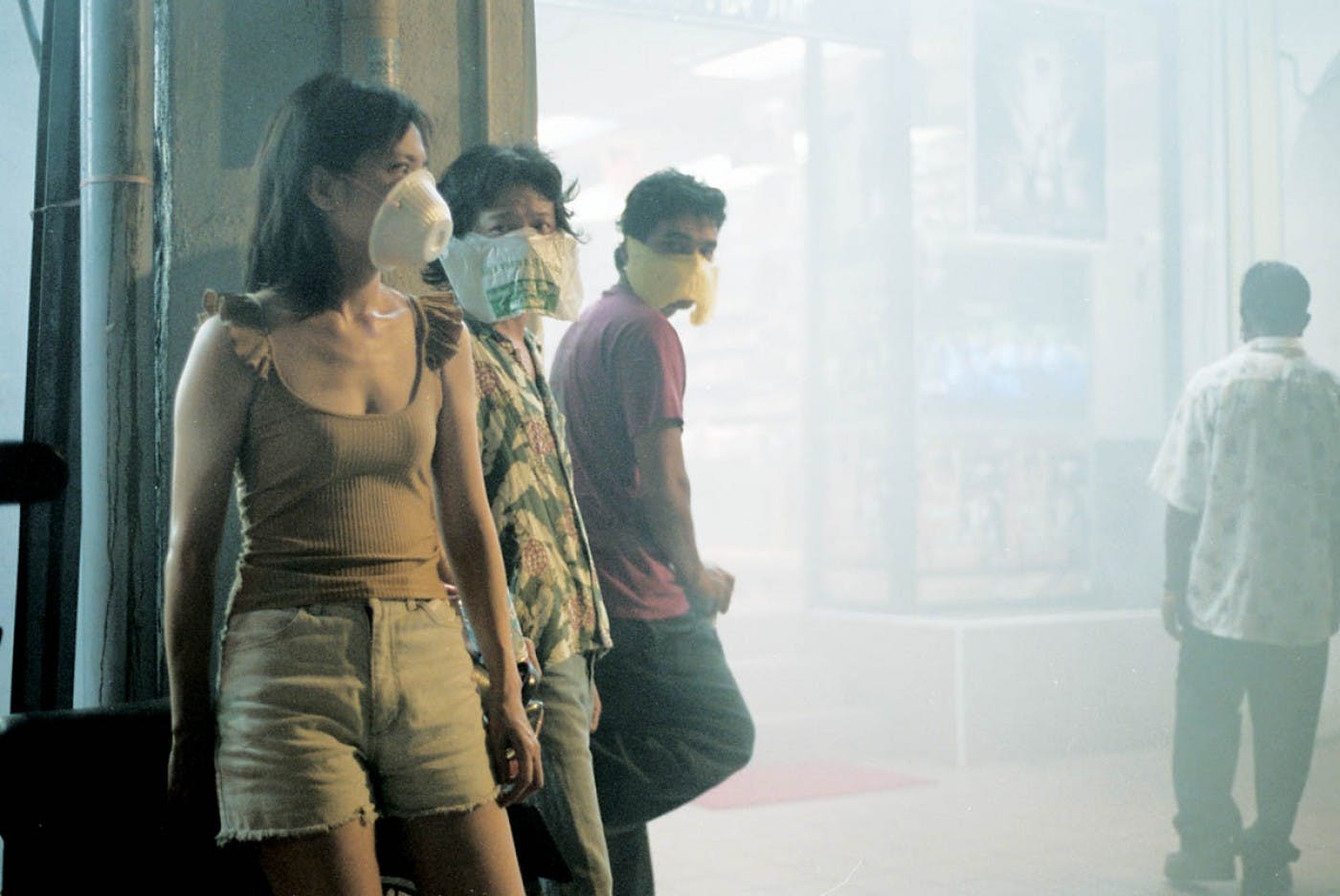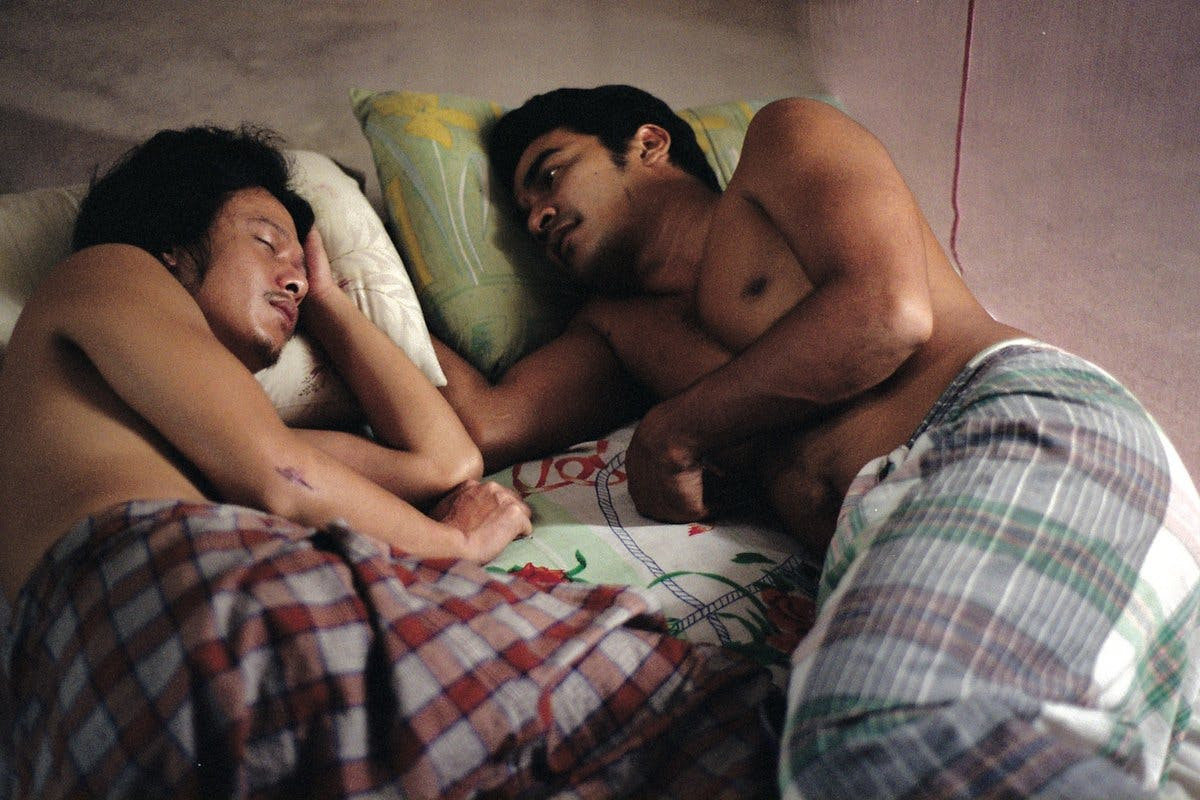In the deep of quarantine, I often found myself at my work desk with my head turned toward the window. There wasn’t much of a view, just the top fronds of a singular tree waving back and forth slowly, subtly. I would watch it for minutes on end as time ticked away on my screen.
Life in quarantine felt like the slow cinema of existence. I leaned into slow films to while away the staggeringly long spates of time we were granted, and watched Tsai Ming-liang’s I Don't Want To Sleep Alone because of its sentimental title. It felt apt for a moment when relationships turned long distance overnight and, as a society, we had to mask up every time we left the house. We looked at passersby with suspicion even as we missed being around others and longed for the therapy of their bodies.
Midway through the movie, a radio broadcasts that an unknown source of smog has appeared overnight in Kuala Lumpur and that everyone should take safety precautions. In an eerily prescient scene for our times, the cast of characters—a homeless man played by Tsai’s critically acclaimed darling, Lee Kang-Sheng, a cafe waitress played by Chen Shiang-Chyi, and a Bangladeshi migrant worker named Rawang played by Norman Atun—start wearing masks fashioned out of plastic bags and instant ramen bowls. Linked together in a tableau vivant, the homeless man and the waitress suddenly break away to consummate their relationship at an abandoned construction site where Rawang has left a mattress at. As they kiss, they pause to take ragged breaths through the legs of the jeans they just stripped off. Act on what you want and the world will suffocate you for it, Tsai seems to say, as he unleashes his godlike tendency of making a film's universe uninhabitable once two people find solace within each other. He’s done this before in The Hole when the last two people alive in an apartment complex are first disgusted, then aroused by each other before the woman is turned into a roach by the nebulous epidemic that’s emptying out Taipei. In The River, a man finds the cure to the strange ailment in his neck after he jerks a man off in the dark of a gay sauna, only to find out soon after that it was his own father he had touched.

Among critics like Film Comment’s Chuck Stephens, this has won Tsai the sobriquet of being a “sexistential” filmmaker. But something about I Don't Want To Sleep Alone diverges from the traditional closed circuit of desire where pleasure brings catastrophe. It brought me waves of contentment despite its inhospitable world, and generates a politics of care, queerness, and futurity within the film’s migrant spaces earmarked for destruction.
Tsai’s films are often loose on plot, and the narrative of I Don't Want To Sleep Alone drifts along with the movements of a mattress as it passes from character to character. Initially recovered off the street by Rawang and the five buddies he lives with, it becomes the resting ground where he nurses a beaten-up homeless man back to health. The mattress moves from the cramped room Rawang shares with other workers to an abandoned construction site where he and the homeless man ostensibly sleep together. It later becomes a space for the homeless man to sleep with the waitress, and finally it moves into the waitress’ attic room where all three of them sleep together. It’s unclear if any actual intercourse takes place between the different permutations of bodies — though the homeless man and the waitress come close to it, the act dissolves into them gasping for air before the camera cuts. Through it all, the film is crowded with images of sleep, which serve as the only oasis from the stupor of living. When the waitress is thrusted out of sleep, she groans as she returns to a world streaky with heat and loud with the mechanic whir of construction. At the cafe where she works, dark hands pass beers around as workers lean back into their chairs to laugh. In a long take, she is the only person to sit still, eyes zoning out, when the homeless man appears as a speck in the distance, squatting and watching her.
Instead of being driven by plot, the film reads more as Tsai’s desire to trace the varying places and spaces that migrants inhabit in an otherwise cosmopolitan Malaysia. Beyond just a vision of the flophouses, streetside diners, and alleyways where his cast roam, there is also the polyphonic soundscape that populates an otherwise dialogue-free film: the Malay folk songs of street buskers, the jangly pop of Bollywood filtered through an analog TV, the silent drip-drop of water in a flooded construction site, and the raucous laughter and clap of coffee cups in the cafe that must now be razed, given the modernization of the city and the completion of the construction projects the laborers were brought in for.
These soundscapes heighten the ephemeral and transitory nature of this corner of the world. Writing on psychogeography in The Practice of Everyday Life, the French philosopher Michel de Certeau conceived of space not as the location where life occurs, but as “composed of intersections of mobile elements” that generate space. Space thus becomes the way bodies can be connected. In the earlier parts of the film, Tsai uses wide shots to create distance between the characters, often having them occupy different ends of the frame. They come across each other as pedestrians, waiting at the same street hawker or barely catching sight of the other as one of them walks back home. When they finally meet, they make a lonely orbit around the other, one leading and the other chasing, or all three standing still, always with gaps between them. But the mattress, when it shows up, draws taut the invisible thread between them and makes their relationships legible. It is only on the mattress that they can cross and generate space for each other to exist outside of their alienation. On the mattress, their elbows touch and their bodies slide together.
When the waitress and the homeless man initially try to find a place to sleep together, they are rejected from multiple hotels because the homeless man doesn’t have passport identification. This tracks with his muteness. In the opening scene, a grifter addresses him in four different languages to get him to talk, but he remains mum, unidentifiable to them. They shake him down for money and find the plain shopping bag with his few personal accoutrements useless, prompting them to beat him up. The homeless man is a subject that exists nowhere within the state. So to the scavenged mattress the two go, the only space that can hold them.
The mattress is also where care is postured as a core principle and building block of the world the three outsiders create for themselves. Rawang spoon feeds congee to the homeless man, cooling it with his breath as a poster of a rose with the words “I LOVE YOU” hovers over them. To soothe a fever, Rawang rests an iced drink on the homeless man’s forehead. This makeshift ice pack becomes a sudden benediction when the homeless man wakes up. Clearly dehydrated, he takes huge gulps from it before lying back down to rest. Even the presumably penniless homeless man has a token of affection to share, and he tosses something at the waitress when they cross in the stairwell. When she returns home, she unties the bag to find a light-up toy, something one would normally give a child. She is delighted by it; it reappears in the foreground when she comes home to rest with both of them.

Yet this world of care is still situated within the real world of Malaysia, which Tsai gestures to in the Chinese name of the film, 黑眼圈, or “Hēi yǎn quān.” Directly translating to “dark circles,” it references the black circles around former Malaysian Deputy Prime Minister Anwar Ibrahim’s eyes after he was beaten and arrested by police for allegedly sleeping with another man. In Malaysia, gay sex is illegal under both Islamic and civil law and is punishable by fine, caning, and up to 20 years in prison. In court, state prosecutors presented the mattress Ibrahim allegedly slept on as evidence of the crime. Before Tsai’s film made the festival circuits, the Malaysian government scrubbed it of the sex scenes between Rawang and the homeless man. What survived the wipe-down is only what a fearful government permitted to remain, which actually becomes subversive in relief. Michel Foucault once said in an interview about the pleasures of friendship that homosexuality scared people not because of the deviant cruising it was already associated with, but because of its potentiality: the potentiality for men to relate to each other, to care for each other. It terrified people to consider the possibilities of men being close to each other outside of the narrow tunnel of momentary sexual encounters.
It’s quite fitting, then, that the homeless man is beaten up in the beginning of the film as well and that Rawang’s gentle, patient acts give him a different ending than the one Ibrahim faced. What remains in the film are scenes of great care and of the mattress as a record of emotions. Affection blooms in real time when Rawang hefts the homeless man (who cannot stand) up to urinate, or when Rawang kicks his roommate off the bed and smoothes the sheets back for the homeless man who he hears coming down the hallway. The two fumigate the mattress with bug spray and have nowhere to sleep, when the homeless man suddenly reaches up to itch Rawang’s back without him asking. The homeless man wakes up to Rawang pressing a can lid to his throat, after finding the homeless man on the mattress with someone else. Can one admit the evidence of Rawang’s tears alongside the evidence of a soiled mattress as part of a relationship? Would the courts adjudicate on that as well?
In an Asian film canon where queer relationships cannot have a future, affection is relegated to hiding, deception, and a secret vocabulary of gestures. But the pure bliss that I Don't Want To Sleep Alone ends on is a portal out of there. When the homeless man turns over to place an arm over the waitress and the three are revealed as being all together in bed, the scene cuts to the mattress floating away as a lily pad would in the reflecting pool of the construction site. The noise of the world fades into a romantic Mandarin ballad playing in the background. The three of them sleep in peace on a slow boat towards forever. I feel hope without consequences, an optimism often hard to excavate from Tsai’s repertoire. In a world, much like my own, where time feels pleasant only in sleep, as a retreat from the impossible headache of existence, there is the promise of another body giving off a sigh of heat. It is true—I Don't Want To Sleep Alone.

